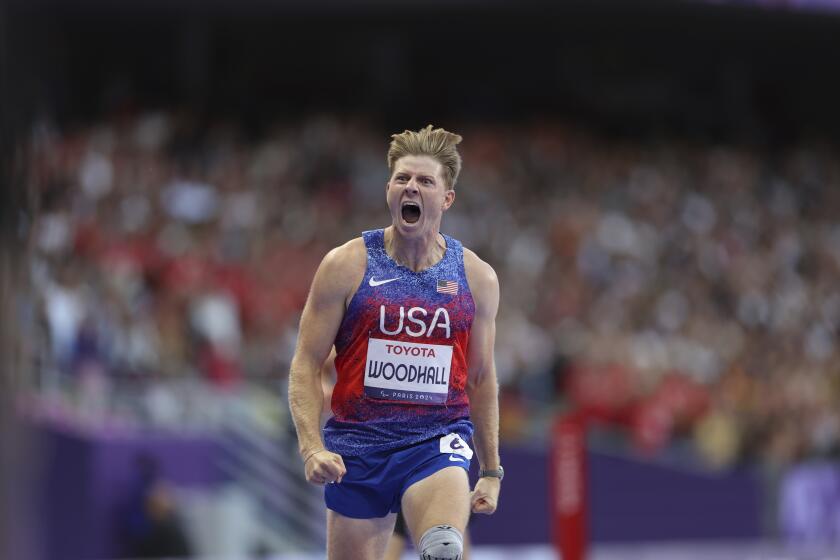Olympic Hockey Provides Opportunity and Problems
Just imagine:
John LeClair has the puck. Eric Lindros wants it, and checks LeClair into the boards. Hard. LeClair slumps to the ice and must be carried into the dressing room. He is diagnosed with a serious knee injury and his availability for the NHL playoffs is in doubt.
Come the Olympics in February, it could happen--if not with Philadelphia teammates Lindros and LeClair, then with Vancouver’s Mark Messier and Alexander Mogilny or with Pittsburgh’s Jaromir Jagr and Kevin Hatcher.
But why would Lindros, the Flyers’ captain, put such a devastating hit on LeClair, his high-scoring linemate?
In the name of national pride, of course. Lindros is a Canadian; LeClair, an American.
For the first time, the world’s best hockey players will compete in the Olympics because the NHL is taking a 2 1/2-week break to let them.
The Winter Games in Nagano, Japan, present a unique opportunity for a sport that for decades has ranked a distant fourth in popularity behind football, baseball and basketball.
“The long-term goal is to increase the exposure of the sport and to enable its fan base to grow,” NHL commissioner Gary Bettman said. “Hockey will be on a high pedestal and the competition will be at the highest level.”
With the unique opportunity, however, there could be unique problems.
Injury. Divided dressing rooms. Lost momentum. Competitive disadvantages.
Hockey in Nagano will be nothing like Olympic basketball, which the U.S. Dream Team has dominated since 1992. There will be six dream teams--the United States, Canada, Russia, Sweden, Finland and the Czech Republic--and NHL locker rooms could turn into political battle zones.
“You might have three Americans, three Canadians and two Russians on your team who played in the Olympics,” Dallas Stars defenseman Shawn Chambers said. “There might be bad blood, and now you’ve got to be teammates again. It could be a little iffy.”
Olympic contests will be civil wars, with NHL teammates battling each other because they come from different countries.
Lindros vs. LeClair. Messier vs. Mogilny. Jagr vs. Hatcher. Wayne Gretzky vs. Brian Leetch. Peter Forsberg vs. Joe Sakic. Teemu Selanne vs. Paul Kariya.
The World Cup, Canada Cup and World Championships have similar situations, but the Olympics will be on a much grander scale. All the world will be watching, and there will be intense pressure to do whatever it takes to win the gold medal.
The midseason time frame also makes the Olympics vastly different from other international tournaments, which take place in the spring or summer.
The NHL already will have gone through three weeks of exhibitions and four grueling regular-season months before players spend most of two days traveling to Nagano. Then, barely recovered from jet lag, they will get to practice together for only four days before being expected to compete at the highest level. Then they’ll return to North America, with the season resuming Feb. 25--just three days after the gold-medal game.
“I’m excited about the exposure the Olympics will give to the NHL, but I’m scared to death about the injury factor,” said Jack Ferreira, general manager of the Anaheim Mighty Ducks and assistant GM of the U.S. Olympic team.
“The competition will be intense and injuries are inevitable. When we get back, we’ll be in the stretch run of the regular season and then the playoffs. You hate to think that an injury suffered in nonleague games could play a role in determining the champion of our league.”
Lindros hurt his groin during the World Cup a year ago and missed last season’s first 23 games. What would a similar injury, coming less than two months before the playoffs, do to the Flyers’ 1998 Stanley Cup hopes?
“This is what the NHL agreed to,” said Lindros, who doesn’t like talking about the Olympics. “And they wouldn’t do anything to harm the game.”
But many fans might be turned off by the Olympics because of the 2 1/2-week hiatus and because many Olympic games won’t be televised in North America until the wee hours. For example, due to the break and scheduling conflicts at the United Center, the Chicago Blackhawks will go an entire month without a home game.
While the Olympians go at it in Nagano, most NHL players will be relaxing and practicing. Momentum gathered before the break could evaporate, and players could fall out of “game shape.”
“It’s a valid concern,” said Stars GM Bob Gainey, an assistant GM for the Canadian Olympic team. “But I compare it to ‘92, when we had a strike just before the playoffs and missed 10 days. Despite that, I thought it was the best playoffs ever. It was a great recuperating time for the players.”
St. Louis wing Brett Hull, a likely U.S. Olympian, expects to have an “unbelievable” experience in Nagano.
“But,” he said, “I think the vacation the other guys are going to have in the middle of the season is going to be pretty good, too.”
Which raises the fairness question.
“Teams that send only a couple of players to the Olympics might have a huge edge over clubs that send seven, eight, nine players,” Ferreira said. “I hope the impact isn’t too significant.”
The Olympians’ trip won’t be the first made to Japan by NHL players this season: The Mighty Ducks and Vancouver Canucks open with two games in Tokyo next weekend.
The international theme also will prevail at January’s All-Star game in Vancouver, with players being divided not by conferences as in the past but by nationalities--North America vs. the rest of the world.
It’s the Olympic factor, however, that could make 1997-98 the most important season in NHL history.
The league finally has its showcase event. And if most of the negatives are avoided, the Olympics could lead to unprecedented growth of the sport.
More TV money. More corporate support. More hockey on everyone’s mind.
“That’s the idea,” Gainey said. “I think this is the opportunity our league has been waiting for.”
More to Read
Go beyond the scoreboard
Get the latest on L.A.'s teams in the daily Sports Report newsletter.
You may occasionally receive promotional content from the Los Angeles Times.







